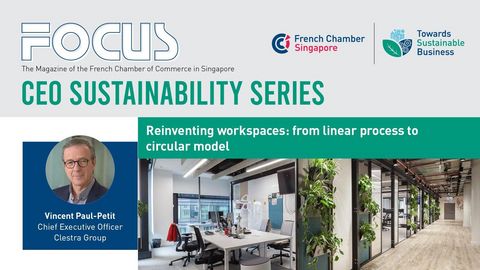Companies news • Analyses & Studies • Portraits • Publications
CEO Sustainability Series | Interview with Vincent Paul-Petit, Chief Executive Officer, Clestra Group

As part of the our Sustainable Business initiative, the French Chamber of Commerce in Singapore presents a leadership interview series where we invite CEOs and key executives to discuss crucial management qualities that drive successful sustainable transformation.
The Clestra Group is a global manufacturer specialized in modular construction solutions for tertiary workspace fit-out and advanced facilities construction.
We pioneered the invention and diffusion of modular office partitioning in the US in the beginning of the 20th century before spreading these innovations across the world. The company is now headquartered in France near Strasbourg and part of KC Green Holdings, an industrial South-Korean consortium. Our expertise in offsite manufacturing and modular construction puts us at the forefront of the transformation of the construction industry.

Question 1: What does sustainability mean to your organisation?
Sustainability is both a requirement and an opportunity for our Group across the world. A requirement first because as a global manufacturer, it is our responsibility to reduce the carbon footprint of all our operations. Our 3 main factories, located in France, China and South-Korea, are the backbone of our value proposition, since we perform most of the builders’ work offsite. It is therefore extremely important for us to ensure our manufacturing processes not only achieve the highest efficiency, but also meet stringent environmental norms.
The global push toward sustainability is also an opportunity for Clestra as a player in the construction industry. Our industry is notoriously a large emitter of carbon dioxide, mostly because of the use of carbon-intensive materials, but also because of recurring inefficiencies in the construction process itself, leading to excessive waste of materials and rising embodied carbon emissions. Clestra has long been an advocate for prefabrication to reduce onsite work and promote space flexibility through modular-designed products. We are now moving even further by implementing circular economy principles into our Value Chain to increase assets reusability between projects.
A Clestra partition panel has a theoretical lifespan of up to 50 years. During this time frame, it can be used and reused multiple times to suit the needs of several clients. We emphasize these principles to help our clients find alternatives to linear design and construction processes, and instead move toward circular value chains to create their workspaces. As an example of this new circular model, we are currently delivering a new office for one of our major clients in the Tours Duo in Paris where most of their workspace fit out is made from reused modular partitions. Their assets can also be stored in our logistic platform to perform transformation work. It is an example of a virtuous partnership aiming at reducing resource use.

Question 2: What has your company’s sustainability journey been so far?
We have first focused our efforts on our factories, by implementing strict utilities saving policies through the installation of energy-efficient lightings and closed water circuits to optimize our water consumption. As for our processes, we are now only using solvent-free glues and paints on our production lines as well as progressively replacing plastic joints with PVC-free joints to further reduce our reliance on harmful chemicals. Multiple efforts have also been undertaken to reduce the use of disposable packaging and items and replace them with reusable cardboard crates, gloves and modular storage systems instead of traditional pallets.
On top of that, we are also part of the ‘GoGreen’ initiative of our logistics partner DHL, which helps in compensating our logistic-related emissions and finance sustainable initiatives. This move is part of a larger program ran by Clestra with its suppliers to ensure and meet strict environmental requirements. To help our clients achieve their sustainability goals, we also strive for obtaining the most advanced environmental certifications. Most of our products are now certified under the EPD scheme and are undergoing Cradle-to-Cradle certification assessments. Meeting these international standards is very important for us and these efforts are part of our global program ‘Think the Green’, a large-scale initiative of continuous improvement and product development.




